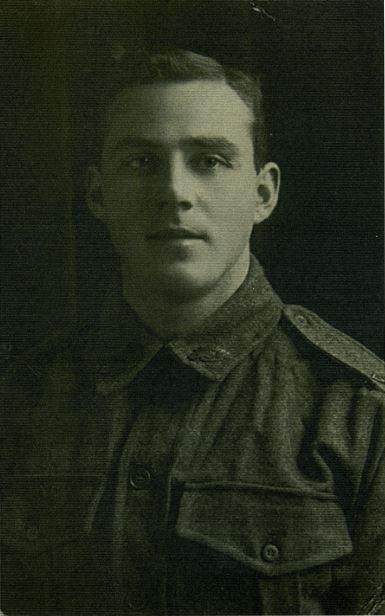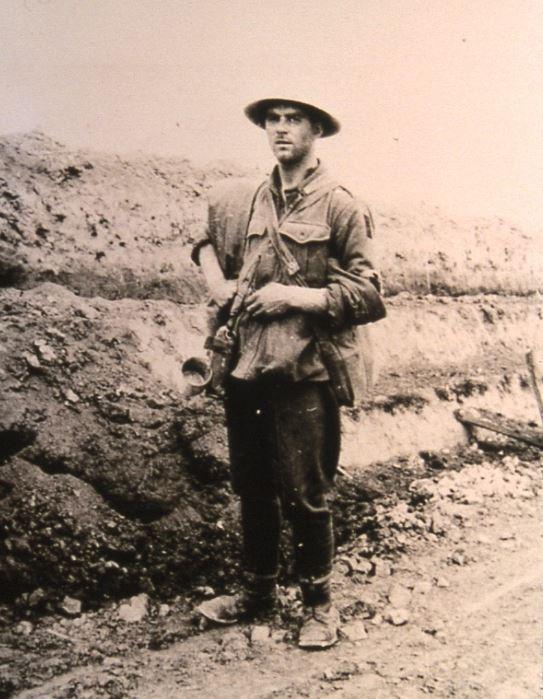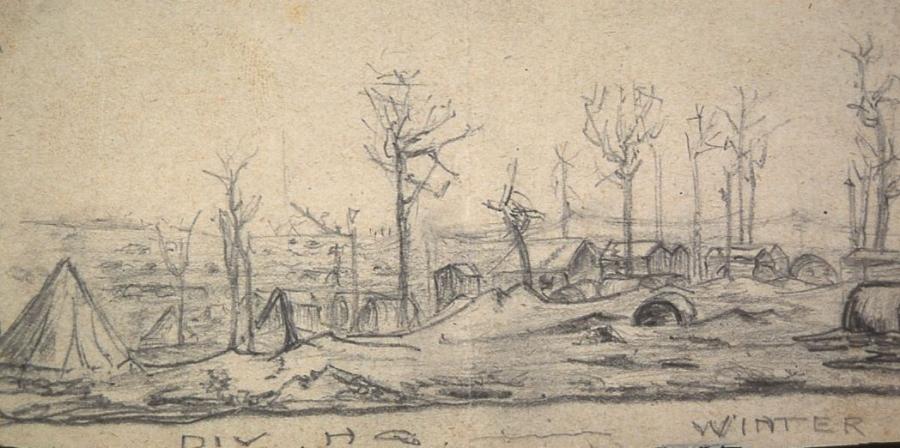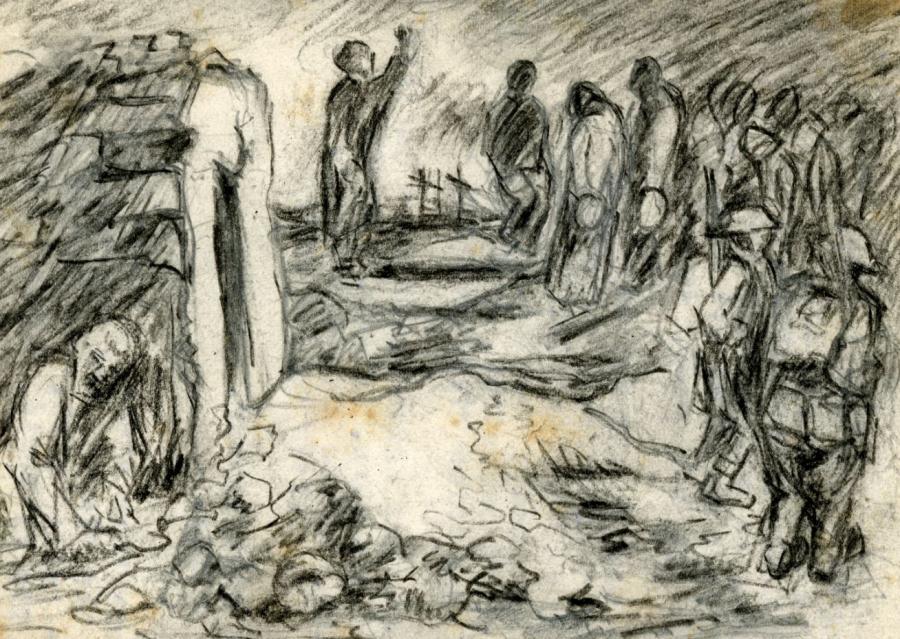The Glass Soldier

Nelson Ferguson. Photo: Courtesy Don Farrands.
Nelson Ferguson's story is a remarkable one: a story that's been described as one of war and bravery, pain and strength, and hope and miracles.
A 22-year-old art teacher from Ballarat, he enlisted in 1915 and served as stretcher-bearer on the Western Front in France.
There, he witnessed the horrors of the First World War, hauling stretchers through some of Australia’s most horrific battles – the Somme, Bullecourt, Ypres and Villers-Bretonneux.
But what makes his story truly remarkable is what comes after.
He was gassed during the battle of Villers-Bretonneux in April 1918, leaving his eyes severely traumatised and his lungs damaged.
Returning home, he met and married the love of his life, Madeline, and resumed his teaching career, teaching art at RMIT in Melbourne until the 1960s, even though he could barely see.
Eventually the effects of the mustard gas claimed his eyesight, effectively ending his career. But Ferguson continued contributing to society by helping his son and son-in-law in their stained-glass window business as a “guiding spirit”, earning himself the moniker “The Glass Soldier”.
In 1969, advances in medical science finally restored his sight and he was able to see the glass creations for the first time and appreciate the beauty around him once more.

Nelson Ferguson. Photo: Courtesy Don Farrands.
His story is told in a moving work The Glass Soldier Suite by Nigel Westlake, the award-winning Australian composer behind the movie Babe.
Westlake’s work is the centrepiece of The Diggers’ Requiem, which tells the story of Australians on the Western Front in 12 movements.
Composed by seven contemporary Australian composers, The Diggers’ Requiem commemorates the centenary of the end of the First World War and concludes with the ringing of 62,000 bells in memory of each of the Australians who died during the First World War.
Jointly commissioned by the Australian War Memorial and the Department of Veterans’ Affairs, The Diggers’ Requiem was produced and directed by the Memorial’s musical artist-in-residence, Christopher Latham, and will be performed by the Australian War Memorial Orchestra and Choir with members of the Band of the Royal Military College Duntroon.
Westlake said The Glass Soldier was an epic love story, steeped in pathos, drama, tragedy and triumph against adversity.
“I am deeply humbled to be offered the opportunity to make an artistic contribution to The Diggers’ Requiem, a project of overwhelming significance and profound cultural legacy,” Westlake said.
“When Melbourne barrister Don Farrands first showed me the memoirs of his grandfather, Nelson Ferguson, I was deeply moved by the tenderness and courage of an extraordinary life.
“Don’s invitation to enshrine his grandfather’s legacy in a musical work was a huge responsibility and an inspiring task. As I immersed myself in historical documents of the era, I recognised an Australia marked by very different attitudes and values, and a people who were besieged by the challenge of grappling with their fate, and the trauma associated with the Great War. It was like opening a time capsule, preserved like a long-forgotten love letter and aching like an old war wound …
“With great sensitivity and informed awareness, Chris Latham has enshrined the fabric of Nelson’s individual narrative into the context of a much broader chronicle of honour and dedication to the many thousands of lives sacrificed.
“It is my hope that The Diggers’ Requiem has the capacity to become a musical shrine of commemoration, a catalyst for our national grieving and a consolation for all those affected by the tragedy of war.”

Nelson Ferguson's work. Image: Courtesy Don Farrands.
Latham said Ferguson’s story was a remarkable story of hope and healing after the horror of war.
“At its heart it is a story of healing,” Latham said. “At the end of his life, the government approved experimental surgery to replace his damaged corneas so Ferguson was able to finally see the windows he and his sons had created.
“This transformation of trauma into a transcendent art form inspired one of Nigel’s greatest masterworks.
“I recognised that this masterwork could form the spine of a great communal piece that would honour the Australians who died on the Western Front: a musical form that could be played on Anzac Day and speak not just to arts audiences, but to everyone who lost family in that tragedy.”
The work of extending Nigel’s Glass Soldier material for The Diggers’ Requiem took three years and involved travelling to France to perform scaled down versions on the battlefields to mark their centenaries, just as Latham had done with the Gallipoli Symphony for the centenary of the Gallipoli landings.
The Diggers’ Requiem tells the story of the iconic battles for Australians on the Western Front, including Fromelles, Pozières, Bapaume, Bullecourt, Ypres and Passchendaele, Villers-Bretonneux, and Amiens. It includes works by composers Nigel Westlake, Elena Kats-Chernin, Richard Mills, Graeme Koehne, Ross Edwards, Andrew Schultz and Christopher Latham as well as the final work by the Australian composer Frederick Septimus Kelly – the Somme Lament – which was completed just two weeks before he was killed on the Somme in 1916.
“The risk with all such projects is that one can end up glorifying war, but clearly war is the true enemy which one must defeat through peace,” Latham said.
“Only by being there, and experiencing first-hand the overwhelming echo of those events could I be sure that we would tell the truth of what happened and create something valid that could represent all those who were killed or damaged by those eruptions of unfathomable violence.”
The Diggers’ Requiem will have its Australian premiere at the Llewellyn Hall at the Australian National University in Canberra on Saturday 6 October 2018 and will be broadcast nationally on Classic FM and recorded for CD. Don Farrands' book, The Glass Soldier, will also be available on the night. The Glass Soldier book, by Don Farrands, is published by Big Sky Publishing, 2017. For more information about The Diggers’ Requiem, visit theflowersofwar.org

Nelson Ferguson's work. Image: Courtesy Don Farrands